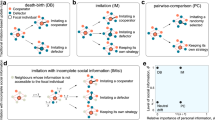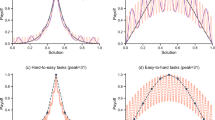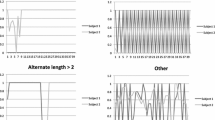Abstract
We study the effects of learning by imitating others within the framework of an iterated game in which the members of two complementary populations interact via random pairing at each round. This allows us to compare both the fitness of different strategies within a population and the performance of populations in which members have access to different types of strategies. Previous studies reveal some emergent dynamics at the population level, when players learn individually. We here investigate a different mechanism in which players can choose between two different learning strategies, individual or social. Imitating behavior can spread within a mixed population, with the frequency of imitators varying over generation time. When compared to a pure population with solely individual learners, a mixed population with both individual and social learners can do better, independently of the precise learning scheme employed. We can then search for the best imitating strategy. Imitating the neighbor with the highest payoff turns out to be consistently superior. This is in agreement with findings in experimental and model studies that have been carried out in different settings.




Similar content being viewed by others
References
Barnard CJ, Sibly RM (1981) Producers and scroungers: a general model and its application to adptive flocks of house sparrows. Animal Behav 29:543
Boyd R, Richerson PJ (1985) Culture and evolutionary process. University of Chicago Press, Chicago
Giraldeau L-A, Valone TJ, Templeton JJ (2002) Potential disadvantages of using socially acquired information. Philos Trans Royal Soc Lond 357:1559
Hammerstein P (ed) (2003) Genetic and cultural evolution of cooperation. MIT Press, Cambridge
Jost J, Li W (2005) Individual strategies in complementarity games and population dynamics. Physica A 345:245–266
Jost J, Li W (2008) Learning, evolution and population dynamics, Adv Complex Syst 11:901
Laland KN (2004) Social learning strategies. Learn Behav 32(1):4
Mesoudi A (2011) An experimental comparison of human social learning strategies: payoff-biased social learning is adaptive but underused. Evol Hum Behav 32:334–342
Rendell L, Forgarty L, Laland KN (2009) Rogers’ paradox recast and resolved: population structure and the evolution of social learning strategies. Evolution 64(2):534
Rogers AR (1988) Does biology constrain culture? Am Anthropol 90:819
Author information
Authors and Affiliations
Corresponding author
Rights and permissions
About this article
Cite this article
Jost, J., Li, W. Group level effects of social versus individual learning. Theory Biosci. 132, 115–121 (2013). https://doi.org/10.1007/s12064-013-0175-6
Received:
Accepted:
Published:
Issue Date:
DOI: https://doi.org/10.1007/s12064-013-0175-6




